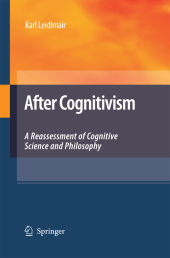 Neuerscheinungen 2014Stand: 2020-02-01 |
Schnellsuche
ISBN/Stichwort/Autor
|
Herderstraße 10
10625 Berlin
Tel.: 030 315 714 16
Fax 030 315 714 14
info@buchspektrum.de |

Karl Leidlmair
After Cognitivism
A Reassessment of Cognitive Science and Philosophy
2009. 2014. xviii, 229 S. 235 mm
Verlag/Jahr: SPRINGER NETHERLANDS; SPRINGER 2014
ISBN: 9400791720 (9400791720)
Neue ISBN: 978-9400791725 (9789400791725)
Preis und Lieferzeit: Bitte klicken
This collection of papers deals with the reassessment of thinking in Cognitive Science and in Philosophy today. The book outlines the new orthodoxy in Cognitive Science, and is unique in covering both analytic and continental philosophy.
There is a basic perplexity in our times. On the one hand, we ?nd a blind trust in technology and rationalism. In our neo-liberalistically dominated world only what can be rapidly exploited and commercialized seems to count. The only opposing reaction to this kind of rationalism is an extreme rejection of all kinds of reasoning, and sometimes attendant religious fundamentalism. But instead of re?ecting on the limits and possibilites of reasoning, dialogue is replaced by a demagogic struggle between cultures. One cause of the blind trust in technology is misunderstandings about the sign- cance and the application of theories in the reception of the so-called Enlightenment. The Enlightenment is essentially characterized by two forces: (i) the conception of society as a social contract and (ii) the new science (New- nian physics, etc.). But as a result we lost ground: Atomistic individualism nourished the illusion of a self-contained ego prior to man´s entering into a shared inter-subjective world. And in the new science, our constructions of reality became autonomous and indep- dent of our interventions. Thus we became caught in the inherent dynamism of our computational constructions of reality. Science, as it is applied today, operates with far too simple parameters and model-theoretic constructions - erroneously taking the latter (the models) as literal descriptions of reality.
1. The Pragmatic Dimension: a Reassessment of Scientific Theories. 1.1. Towards a Technology- and Action-oriented Methodology of Constructive Realism, H. Lenk. 1.2. The Three Enligthenments, H. Putnam. 2. Artificial Intelligence and the Embodiment of the Mind. 2.1. Why Heidggerian AI Failed and how Fixing it would Require making it more Heideggerian, H. Dreyfus. 2.2. The New Orthodoxy: Humans, Animals, Heidegger and Dreyfus, H. Collins. 2.3. The Key to the Chinese Room, S. Gallagher. 3. Socialization in the Internet between Dissolution and Extension of the Human Self. 3.1. The Play of Imagination: Extending the Literary Mind, D. Thomas, J.S. Brown. 3.2. Reading the World Upside-Down. How to Deal with Frozen Knowledge, K. Leidlmair. 3.3. On the significance of the ´lower´ senses: Touch, Smell and Taste, B. Becker. 4. New Research Strategies in Psychology and Psychotherapy. 4.1. We can think with the implicit, as well as with fully-formed concepts, E. Gendlin. 4.2. Embodied Knowledge in Design, P. Sachse, M. Furtner. 4.3. The Second Cognitive Revolution, R. Harré. 5. Ethical and Economic aspects. 5.1. The illusion of free will and its acceptance, G. Trautteur. 5.2. Three Concepts of Liberty, S. Shanker. 5.3. Premises and Promises of Economic Theory Formation, F. Hörmann.


